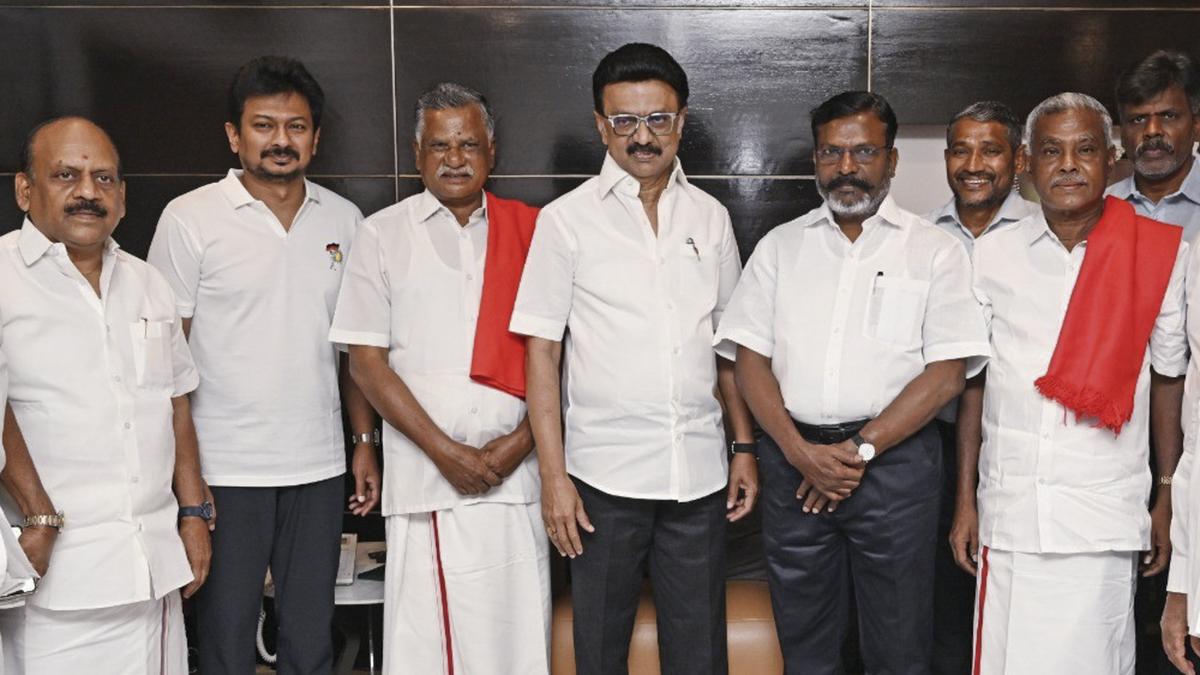 |
|
The article centers on Viduthalai Chiruthaigal Katchi (VCK) founder Thol. Thirumavalavan's plea to the DMK government in Tamil Nadu to enact a separate law against honour-based crimes, irrespective of opposition from caste outfits. Thirumavalavan argues that such a law is crucial for fostering a 'democratic revolution' and addressing a national issue that transcends caste boundaries. He emphasizes that honour-based crimes affect various communities and states, even within Scheduled Castes (SCs) and Other Backward Classes (OBCs). To bolster his argument, Thirumavalavan draws parallels with historical instances where progressive legislation faced initial resistance, citing the Hindu Marriage (Tamil Nadu Amendment) Act, 1967, legalizing self-respect marriages, and the implementation of the Mandal Commission's recommendations, which reserved 27% of government jobs and educational seats for backward classes. These measures, despite encountering opposition from upper and dominant castes, were eventually accepted by society at large. Thirumavalavan believes a separate law against honour killings would follow a similar trajectory, eventually gaining societal acceptance as a necessary step toward social justice. He also met with Chief Minister M.K. Stalin along with CPI and CPI(M) state secretaries, R. Mutharasan and P. Shanmugam. On the other hand, the Tamil Nadu Congress Committee observed a day’s fast led by its SC wing leader, M.P. Ranjan Kumar, inside the Sathyamurthy Bhavan.
Thirumavalavan frames the proposed law not as one exclusively benefiting Scheduled Castes, but as a safeguard against regressive and backward practices affecting all communities. He provides a compelling example of an OBC boy attacking another OBC boy for communicating with a girl from his own caste, illustrating the pervasive nature of honour-based violence. This law, he argues, is aimed at combating these regressive tendencies and promoting a more egalitarian society. He urges Chief Minister Stalin to disregard the objections of caste organizations, expressing confidence that democratic forces within those communities would ultimately support the law. The core of Thirumavalavan's argument rests on the assertion that honour killings are a national problem that requires a dedicated legal framework. He advocates for treating honour-based crimes with the same level of seriousness as crimes against women and Scheduled Castes, which already have specific legal protections. A separate law, he believes, would provide the necessary focus and resources to effectively address this issue.
Thirumavalavan detailed his discussions with Chief Minister Stalin, explaining the need for a distinct law to address honor killings. He highlighted precedents and recommendations from prominent bodies, including the National Commission of Women, the Law Commission of India, and the Supreme Court's directives in the Shakti Vahini vs. Union Of India case. He also referenced bills previously introduced in Parliament and the Tamil Nadu Assembly, demonstrating a history of legislative efforts to combat honour-based violence. He specifically mentioned a bill introduced by CPI-M MLA A. Soundarrajan in the Tamil Nadu Assembly in 2015, and cited Rajasthan's enactment of a separate law against honour killings as a positive example. By presenting these references, Thirumavalavan aims to demonstrate the widespread recognition of the need for a specific legal framework to address honour killings.
Thirumavalavan invokes Tamil Nadu's legacy as a land of social justice and Periyar, emphasizing the state's commitment to the Dravidian model. He appeals to Chief Minister Stalin to uphold this legacy by enacting a separate law against honour killings. While acknowledging that Chief Minister Stalin did not provide any explicit assurances, Thirumavalavan remains hopeful that the Chief Minister will recognize the urgency and importance of this issue. He believes that enacting such a law is a critical step in advancing social justice and protecting vulnerable individuals from honour-based violence. Thirumavalavan's advocacy highlights the complex interplay of caste, gender, and violence in India, and the ongoing struggle to create a more equitable and just society. A dedicated law against honor killings would not only provide legal recourse for victims, but also send a powerful message that such crimes will not be tolerated.
The article is significant because it underscores the persistent challenges of caste-based discrimination and violence in India, even in states like Tamil Nadu, which are known for their progressive social movements. Thirumavalavan's plea for a separate law reflects the limitations of existing legal frameworks in adequately addressing honour killings. The fact that he feels the need to lobby the DMK government, despite its stated commitment to social justice, reveals the political complexities of tackling caste-based issues. The opposition from caste outfits further highlights the deep-seated resistance to social reform. The article serves as a reminder that the fight for social justice is an ongoing process, requiring constant vigilance and advocacy. It also emphasizes the importance of intersectional approaches that address the multiple forms of discrimination that individuals face. In this case, gender and caste intersect to create a particularly vulnerable situation for individuals who defy traditional norms and expectations. Therefore, a law addressing honor killings is not only needed, but also necessary for Tamil Nadu to ensure it lives up to its promise of social justice. While there's no guarantees that the bill will pass and be put into law, the fact that a progressive politician such as Thirumavalavan is bringing the issue to light speaks to the importance of justice for all within the state.
